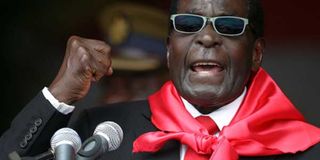Zimbabwe to celebrate 34 years of independence

PHOTO | AFP Zimbabwe's President Robert Mugabe speaks during celebrations marking his 90th birthday in Marondera, on February 23, 2014.
What you need to know:
- As the outlook remains gloomy, many in this Christian-dominated country turn to God on the Independence Day.
- After being in power for 34 years, the ruling Zanu-PF party is grappling with an under-performing economy, liquidity challenges and a generally unhappy populace which does not know what the future holds.
HARARE
Zimbabwe is expected to commemorate the 34th year of independence on Friday, with deteriorating liquidity and rising corruption threatening its economic rejuvenation.
As the outlook remains gloomy, many in this Christian-dominated country turn to God on the Independence Day.
“Good Friday is the day when many Christians meditate. As a Christian I value heavenly issues more than earthly ones. Politics comes second,” said Winnie Mutsvari, a Harare resident.
But thousands of people are expected to show up on Friday at the National Sports Stadium to hear the sermon by President Robert Mugabe, the country’s liberation hero who is now at the age of 90 and will continue with his rule until 2018.
Zimbabwe gained independence from British rule in 1980 after a guerilla warfare of more than a decade.
UNHAPPY POPULACE
After being in power for 34 years, the ruling Zanu-PF party is grappling with an under-performing economy, liquidity challenges and a generally unhappy populace which does not know what the future holds.
Finance Minister Patrick Chinamasa said the economy is projected to grow by more than 6 per cent, but questions are being asked whether the target is too ambitious, as the economy only expanded 3.4 per cent in 2013.
Unemployment is also rising as business activities dipped.
A survey by the Zimbabwe Congress of Trade Unions shows that at least 9,617 job losses and 75 company closures were recorded in 2013 alone.
“In fact, demand for labor is declining and it’s not there,” said labour economist Godfrey Kanyenze in a recent interview.
Economists blamed unattractive policies for foreign investment, over-protective labour laws, and little or no incentives and support for small and micro-businesses for the dire economic situation.
They say the government will have to tackle rooted corruption in both public and private sectors. So far, one chief executive officer of a state enterprise has been dragged to court on fraud charges, but the exact magnitude of the scourge is not yet known.
But the public was outraged by the exposure of unreasonably high salaries of state company executives – some of whom were earning 40,000 U.S. dollars a month while two thirds of the population struggled under the 1 dollar a day poverty line.





